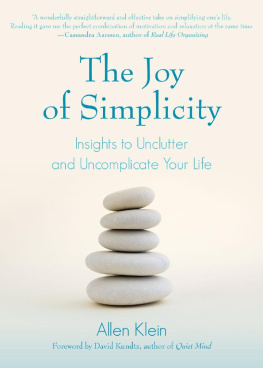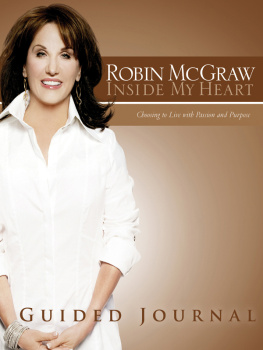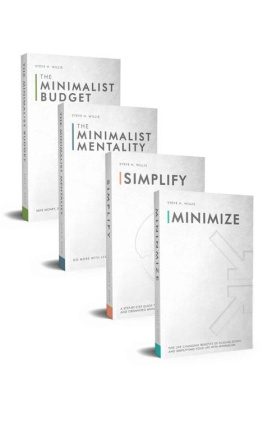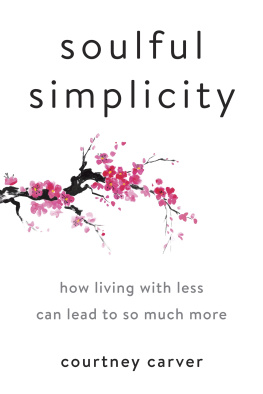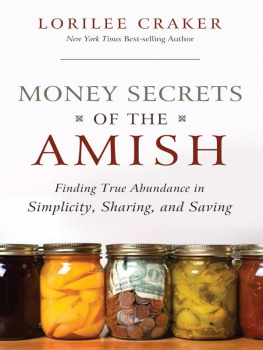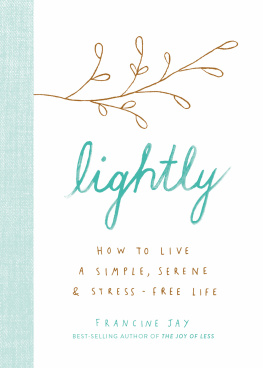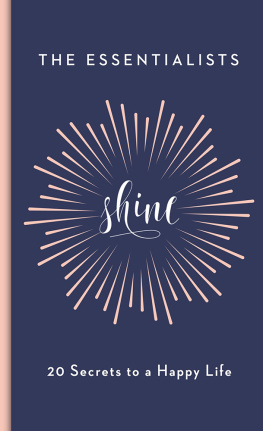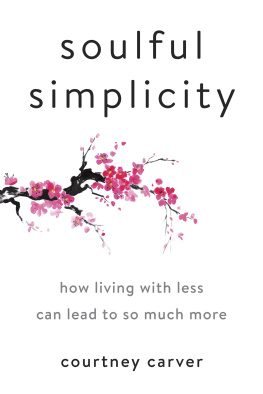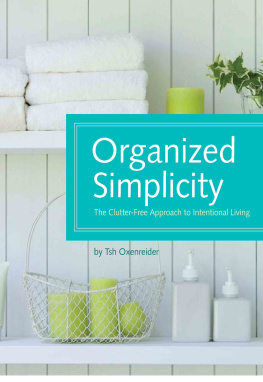Secrets of Simplicity
Secrets of
Simplicity
learn to live better with less
by Mary Carlomagno
illustrations by Andrea Cobb

Text copyright 2008 by Mary Carlomagno.
Illustrations copyright 2008 by Andrea Cobb.
All rights reserved. No part of this book may be reproduced in any form without written permission from the publisher.
Library of Congress Cataloging-in-Publication Data available.
eISBN: 978-0-8118-7164-8
Cover illustration by Andrea Cobb.
Chronicle Books LLC
680 Second Street
San Francisco, California 94107
www.chroniclebooks.com
For my husband, Frank, You are the song that the morning brings.
Contents
Introduction
In countries around the world, a secret revolution is under way: People are rebelling against stuff. Overwhelmed, overcommitted, and caught in a vicious cycle of acquiring, storing, and discarding possessions, more and more people are beginning to feel that they simply do not have time or space to live their lives. Could it be that our busier than thou societyin which people pride themselves on their ability to move through life at breakneck speed and maximum efficiencyhas finally reached capacity?
The Western worlds addiction to accumulating and spending has given rise to new industries that help people to manage their everyday lives. Professional organizers, personal shoppers, style advisers, and even meal-preparation services are now routinely hired by many overwhelmed people who desperately need help to stay ahead of the chaos. The news media have picked up on the stress thats pervading our lives, as well. It seems that every time we flip through a magazine or turn on the television, we see stories about how to manage our time, get organized, find balance in life, and remove clutter.
Just as the obesity epidemic increases the size of the average person, the continuous accumulation of stuff increases the size of our homes and offices. Many of us find it necessary to keep our overabundance of consumer goods outside of our homes in rented storage units, another industry that is rapidly gaining steam.
How can we solve this society-wide problem? Can we find a way to improve the quality of our lives instead of increasing the quantity of our stuff? Perhaps the solution is simpler than we might expect: smaller portions and consuming in moderationin essence, a diet for our stuff.
As a child growing up in suburban New Jersey, my dream was to work in Manhattan and lead a fast-paced city life. When I reached adulthood that dream came true, and for fourteen years I kept up the pace. Over time, however, I found that the great career, the great wardrobe, and the great apartment didnt automatically bring great happiness. Even with all of the perks of the career-girl lifestyle, I realized that I was stuck. Burdened by the myriad choices before me, I felt as if I was being held back from discovering something greater. Finally, in 2003, feeling the same pressures that many of my colleagues were facing, I began to identify the distractions in my life and systematically eliminate them. I wanted to live more consciously with less. My great escape had begun.
I soon found myself devoting hours to organizing, reorganizing, and constantly moving inventory in and out of my home. I discovered that I had a certain passion for organization, and this hobby grew as I began to spend nights and weekends decluttering the closets of family and friends, who were also drowning in their own accumulated stuff. I began to study the principles of simple living and realized that my little revolution was rooted in my own childhood. My parents, both first-generation Italian-Americans, were of the waste not, want not kind. My mother, the consummate homemaker and cook, was able to create an afternoon of fun from a piece of string. As for my father (lets just call him a saver), I could probably devote an entire book to his parsimonious habits. It wasnt that we didnt have much; in fact, we had more than most. However, my family was practical. As an adult, I somehow left all that practicality behind when I moved to the city.
After a few years of indulgence, though, I was starting to view a simpler life through a different, more accepting lens. With the seeds of simplicity now planted in my personal life, I decided to leave the corporate world to pursue my passion for organizing. I started my business, Order, in late 2004 with the purpose of helping people to simplify their lives.
Also supporting my education in the art of simple living were my yoga practice and my study of Hindu teachings, which offered much wisdom about how to find simplicity in life. Other religions and groups, I discovered, shared the practice of simple livingBuddhists and Christians followed by the Shakers and the Amish. My favorite teachings about the simpler lifestyle come from great thinkers like Lao-tzu, the father of Taoism; St. Teresa of Avila; Confucius; and the father of the modern movement of voluntary simplicity, Henry David Thoreau. With the help of these philosophers, we moderns can unlock the secrets to a simpler life, and learn more about the path we are following, by reflecting on where we have been. My experiences, and those of my clients, have shown that making small changes can result in everyday successes. Change starts with subtle shifts in thinking, and tiny steps each day, and I am living proof of this truth. And not only is a shift toward balance and simplicity possible, but it is also critically important for our spiritual wellness.
Every one of the worlds major religious faiths encourages some sort of balance and unity between ones self and ones surroundings. For centuries, philosophers, spiritual leaders, mystics, and poets have studied the idea of simplicity. They have pondered what simplicity means in our daily routine and our spiritual life, the impact it can have on our well-being, and how it relates to our relationship with nature as well as with one another. What theyve discovered is that, in this world of abundance, it is easy for us humans to become distracted and forget what is most important in our lives. But we can steer away from the distractions and rediscover meaning, and simplicity, again. For us, the search for simplicity can take the shape of decluttering, destressing, and detoxing from daily life.
If we are committing to making our lives better, perhaps the natural progression should be to first subtract and not add. But how much should we subtract? Some simple-living movements make conscious efforts to detach from society. I neither advocate for this path nor disparage it. I just want to live in this world more happily. I am not against consumerism altogether; I believe that Pradas fashion and Thoreaus philosophies can coexist.
My hope is that this book, by asking the right questions, inspires you to seek your own unique balance between simplicity and the material world. And that it helps you look within to find the answers you seek.
01: Release
.........................
Taoist philosophy states that when you let something go from your life, something better will come in. It took me a while to learn that this philosophy does not necessarily apply to ones shoe collection. A (now-recovering) shopaholic, I began to find that my purchasing habits were becoming unmanageable. And I wasnt alone. According to The American Journal of Psychiatry, compulsive shopping affects one in twenty Americans. Feeling profoundly dissatisfied with my life, I started to seek the meaning in my madness. Shopping was taking up not only my money and my time but also my energy, I realized. Letting it go would be the first of many steps in my journey toward a simpler life. So I said good-bye to the personal shopper at Saks Fifth Avenue and hello to Lao-tzu, my new stylistspiritual stylist, that is.
Next page

